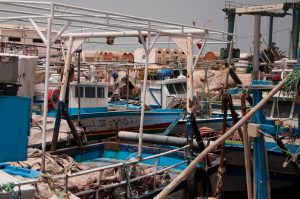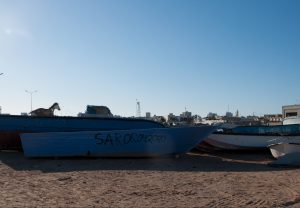 By Morgane Wirtz
By Morgane Wirtz
At the end of August, at least 500 migrants and asylum seekers from Tunisia landed on the island of Lampedusa. Tunisians represent nearly 40% of all illegal arrivals in Italy this year. Lampedusa is overwhelmed.
About 30 boats, carrying nearly 500 people, reached the island of Lampedusa on the last weekend in August. The majority of them had been chartered in Tunisia, about 130 kilometres away. Then, on Saturday night, an old fishing boat landed. On board were 367 migrants crowded together. They were met by protesters from the far-right Ligue party. “Tonight, Lampedusa says: “Enough!“, one of them shouts on a video broadcast by France 24[1]. The emergency reception centre on the island is overcrowded. It currently hosts about 1,160 migrants – 10 times its maximum capacity. The mayor of Lampedusa, Toto Martello, has called for a general strike. The same weekend, 49 people considered fragile were transported to the island after being rescued at sea by the ship Louise Michel, chartered by Bansky. Between January and the end of July 2020, 5,655 Tunisians landed in Italy, compared to 858 in the same period in 2019. They represent a massive 40% of illegal arrivals in Italy in 2020, according to the United Nations High Commissioner for Refugees (UNHCR).
Tunisia is not at war
Facing the peak of arrivals by Tunisians, Italian Foreign Minister Luigi Di Maio announced in July that Tunisia is “considered a safe country and not as a country at war“. However, for Tunisians, there are plenty of reasons to take to the sea. Some leave to obtain better access to health care or social security. Others simply dream of freedom, of being able to travel, and escaping the yoke of family supervision. But the majority are fleeing the economic crisis that has embroiled the country since the revolution. Even before the Covid-19 pandemic, the unemployment rate was around 16%. “It’s very sad”, shares a young Tunisian, “We need our brains, but they prefer to flee to Europe for a higher salary“.
 Italy regularises undocumented migrants
Italy regularises undocumented migrants
The economic crisis resulting from the corona virus pandemic has only exacerbated this situation. Some 160,000 jobs have been lost. The unemployment rate has reached 18% and GDP has fallen by 21.6%, according to Tunisia’s National Statistics Institute. In this bleak landscape, Italy shone a glimmer of hope when in May it announced a massive regularisation of undocumented migrants. The response of aspiring Tunisian migrants was unequivocal: as soon as the situation is more stable in Europe, they intend to disembark! “Have you seen what’s going on in France? It’s hard to go out; it’s a fine of 150 euro [if you don’t respect the lockdown]. But afterwards, all the guys are going to leave [Tunisia for France]. Especially with the current situation, they will carve out,” says a young Tunisian from Djerba.
But Italy has made it clear: it will only regularise undocumented migrants under two conditions: if they have worked before the expiry of their residence permit, prior to 31 October 2019, and if they were resident in Italy on 8 March 2020. But this conditionality does not matter to most Tunisians seeking to reach Europe. As soon as lockdown finished in the majority of European countries and the weather allowed them to cross the Mediterranean Sea without too much danger, Tunisians left en masse. Entire families took to the sea with their suitcases, sometimes accompanied by sub-Saharan migrants and even by their cats![2]
Not welcome
However, illegal Tunisians were not welcomed with open arms in Italy. On 6 August, Foreign Minister Di Maio, in agreement with the Tunisian authorities, announced that the illegal immigrants will be repatriated at the rate of 80 people per week from 10 August. And, on 18 August, following a visit by an Italian-European delegation to Tunisia, 11 million euro in aid was allocated to stem irregular migration. “I want to be very clear: anyone who arrives irregularly in Italy will not be able to take advantage of any opportunity to resolve their situation, because the only result of the arrival of an irregular migrant is to return to their country of origin”[3], warned the Foreign Minister. Between January and July, the Tunisian coastguard and police have already arrested 6,895 migrants and foiled 481 attempts to cross to Italy, according to Tunisian Forum for Economic and Social Rights (FTDES).

Anti-Europe tensions rise
The repatriation of Tunisians who arrived in Italy has not been well received. The FTDES, a major civil society organisation, has deplored the “inhumane conditions that accompany the forced collective repatriation operation“. In the streets, certain reactions are heard: “F**k Europe! It rejects the Tunisians arriving in Italy”, cries a Tunisian. And then, on social networks, historical reminders are circulating: “Cape Bon [in northeast Tunisia] remains the favourite landing place for illegal immigrants from Sicily”, was the headline in La Dépêche Tunisienne on 6 August 1947. At the beginning of the 19th century, nearly 100,000 Italians lived in Tunisia; this is down to a few thousand today.
Morgane Wirtz
Journalist, Researcher and PhD student with Tilburg University
Thank you to ZonMw for funding the research project
[1] https://www.france24.com/en/20200830-boat-carrying-nearly-370-migrants-reaches-italy-s-lampedusa
[2] http://www.webdo.tn/2020/07/10/pupi-le-chat-tunisien-qui-a-traverse-la-mediterranee-et-fini-adopte-par-une-italienne/
[3] https://www.realites.com.tn/2020/08/litalie-debloque-11-millions-deuros-afin-daider-la-tunisie-a-controler-ses-frontieres-maritimes/



